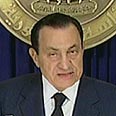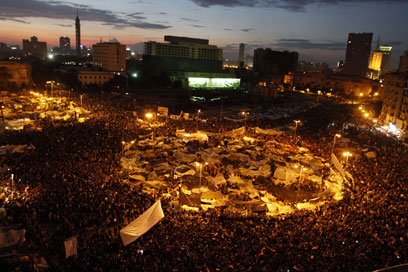
Mubarak says to transfer power but not resigning
Embattled Egyptian leader confirms he won't run for presidency again, will transfer power to Suleiman. Hundreds of thousands at Tahrir Square: Down, Down, Hosni Mubarak
Hosni Mubarak, struggling to cling on as Egypt's president in the face of unprecedented protests over poverty, corruption and oppression, said on Thursday he would transfer powers to his vice president.
In a nationally televised address that failed to meet demands by protesters for him to step down immediately, Mubarak, 82, appeared to step aside by handing over the reins of power to his deputy, Omar Suleiman, a former intelligence chief trusted by Washington.
Protesters in Tahrir Square, waved their shoes in dismay at the speech, shouting: "Down, Down, Hosni Mubarak" enraged by the fact that the president had not stepped down.
Mubarak repeated that he would not stand for the presidency in a September poll and said talks with the opposition, which would have been unthinkable before Jan. 25 when protests began, had led to preliminary consensus to resolve the crisis.
Egypt was heading to a peaceful transfer of power, said the president, stating that he believed in the honesty of the protesters' demands and intentions but underlining his rejection of foreign powers dictating events in his country.
"My sons and daughters, the youth of Egypt, dear fellow citizens, I have announced, without any doubt, that I will not run for the next presidential elections and have said that I have given the country and served the country for 60 years in public service, during wartime and during peacetime," he said.
"I have told you my determination that I will hold steadfast to continue to take on my responsibility to protect the constitution and the rights of people until power is transferred to whomever the people choose during September, the upcoming September, and free and impartial elections that will be safeguarded by the freedom - the call for freedom."
'I will ever accept to hear foreign dictations'
Addressing the anti-government protestors, the Egyptian leader said, "I was a young man, a youth just like all these youth, when I have learned the honor of the military system and to sacrifice for the country. I have spent my entire life defending its land and its sovereignty. I have witnessed and attended its wars with all its defeats and victories. I have lived during defeat and victory.
"During the victory in 1973, my happiest days were when I lifted the Egyptian flag over Sinai. I have faced death several times when I was a pilot. I also faced it in Addis Ababa, Ethiopia and elsewhere. I did not submit nor yield to foreign dictations or others. I have kept the peace. I worked towards the Egyptian stability and security. I have worked to the revival in Egypt and the prosperity," he said.
Mubarak said he felt the pain of those who had lost family in the protests and that he was responding to the nation's demands with commitment and said those who had died, put at possibly 300 by the United Nations, had not died in vain.
He also relayed a warning to the organizers of the mass protests against his regime. "I am telling you before anything, that the blood of the martyrs and the injured will not go in vain. And I would like to affirm, I will not hesitate to punish those who are responsible fiercely. I will hold those in charge who have violated the rights of our youth with the harshest punishment stipulated in the law.
"I am telling families of the innocent victims that I have been so much in pain for their pain, and my heart ached for your heartache," he said.
Mubarak also leveled criticism at the international community, which did not support him since the anti-government riots erupted about a month ago. "I am telling you, as a president of the country, I do not find it a mistake to listen to you and to respond to your requests and demands. But it is shameful and I will not, nor will ever accept to hear foreign dictations, whatever the source might be or whatever the context it came in."
Earlier in the day, the military high command took control of the nation in what some called a military coup after two weeks of unprecedented protests.
Anything less than quitting could provoke a powerful reaction from the street where the core of protesters want his immediate resignation and reject any political manoeuvring that allows him to stay on in some capacity, perhaps as a figurehead.
The armed forces, issuing what they labeled "Communique No.1", announced they were moving to preserve the nation and the aspirations of the people. The Higher Army Council met to try to calm an earthquake of unrest which has shocked the Middle East.
News that Mubarak may hand over power, or be unseated, in this key American ally in the Middle East had provoked loud and emotional cheers in Cairo's Tahrir Square, the focal point for pro-democracy demonstrations. But some in the crowd were quick to protest they did not want military rule.
Mubarak, a former air force commander, was not present at the council meeting. He was to address Egyptians on television.
Ahead of the address, hundreds of thousands flocked to the square and the surrounding streets with some organizers saying this had been the biggest turnout yet to celebrate their role in modern Egyptian history.
"The fact that the army met without Mubarak who is the head of the armed forces means that the military has taken over power and I expect this to be announced shortly in Mubarak's televised speech," Nabil Abdel Fattah, at the Al Ahram Centre for Political and Strategic Studies, said.

'Regime has fallen.' Tahrir Square (Photo: AP)
Major General Hassan Roweny had earlier in the day told tens of thousands of protesters in Tahrir, or Liberation, Square: "Everything you want will be realized."
People chanted: "The people demand the fall of the regime, The regime has fallen".
Others sang: "Civilian, civilian. We don't want it military" -- a call for a freely elected civilian government. It remains to be seen how far the armed forces, which have provided Egypt's post-colonial rulers for six decades, are ready to accept that.
Washington's approach to the turmoil in the most populous Arab nation has been based from the start on Egypt's strategic importance -- as a rare Arab state no longer hostile to Israel, as the guardian of the Suez Canal linking Europe and Asia and as a major force against militant Islam in the Middle East.

Transfer of power. Omar Suleiman (Photo: Reuters)
President Barack Obama, hailing history unfolding, said the United States would support an "orderly and genuine transition to democracy" -- Washington would be publicly uncomfortable if the army held on to power, and also does not want Islamist rule.
Asked if Mubarak would step down, an Egyptian official had told Reuters before the speech: "Most probably". But his information minister had said that would not be the case.
Mubarak had previously refused to step down before September polls, saying this could lead to chaos in Egypt. He has vowed not to go into exile. "This is my country ... and I will die on its soil."
On Tahrir Square, General Roweny urged the crowds to sing the national anthem and keep Egypt safe. US-built Abrams tanks and other armored vehicles stood by.
For many, a key question is whether Suleiman might take over effective control from Mubarak -- who might stay on in a figurehead role -- or whether serving officers in the armed forces would move in instead, possibly declaring martial law.
Suleiman, promoted to be Mubarak's deputy less than two weeks ago, is not widely popular. But a key goal for many at the protests has been for changes to laws to ensure fair elections.
Anthony Skinner of the Maplecroft political risk consultancy said: "In the best case scenario, Suleiman would take over and there would be an accelerated transition to democracy. In a worst-case scenario, this turns into effectively a military coup and the military prove not keen on a transition to democracy."
Analyst Michael Hanna from the Century Foundation said on his Twitter feed: "Will people be satisfied under military rule?
"This could create splits among the opposition, and that is probably what the army is hoping for."
Egypt's sprawling armed forces -- the world's 10th biggest and more than 468,000-strong -- have been at the heart of power since army officers overthrew the British-backed king in 1952.
The army quelled bread riots in Egypt in 1977 and halted a rampage by policemen over pay in 1986, but the scale of the past week's uprising across the country dwarfs those events.
The protest was partly inspired by the example of Tunisia, where street protesters toppled the president on Jan. 14.
Mubarak, who has ruled under emergency laws since he took over when Anwar Sadat was assassinated by Islamist soldiers, also said his son would not stand for election, appointed a vice president for the first time and promised reforms.
"He is going down!" Zeina Hassan said on Facebook.
"We want a civilian state, civilian state, civilian state!" Doaa Abdelaal said on Twitter, an Internet service that many see as a vital catalyst for the protests in Tunisia and Egypt that have electrified oppressed populations across the Arab world.
"The army is worried that tomorrow on Friday the people will overpower state buildings and the army will not be able to fire back," Anees said. "The army now is pressuring Mubarak to resolve the situation."
Organisers had promised another major push on the streets on Friday when protesters planned to move on the state broadcasting building in "The Day of Martyrs" dedicated to the dead.
Washington pressured Mubarak to speed up the pace of reform but stopped short of demanding the resignation of the president of the country, which has a 1979 peace treaty with Israel and an army which receives about $1.3 billion in U.S. aid a year.
- Follow Ynetnews on Facebook










